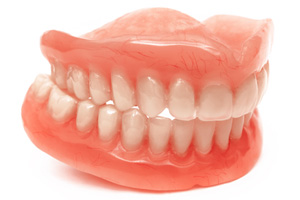Dentures – Lakewood, TX
Giving Your Smile the Restoration It Deserves
 According to the American College of Prosthodontists, nearly 36 million people in the United States do not have any
natural teeth left. The Centers for Disease Control and Prevention (CDC) states that about 1 in 6 (17%) of adults 65
years of age and older have lost all their teeth. Tooth loss is certainly not something you should take lightly or
put off when it comes to treatment. Eating, speaking, and smiling can become increasingly difficult the longer you
wait to see a professional, which is why Dr. Drew Vanderbrook and his team are here to provide dentures in Lakewood to restore your smile.
Whether it is a partial or full denture you need, or you prefer a more stable solution like an implant denture, we
have the right restoration option for you. Contact us
today to find out if you are a good candidate for dentures.
According to the American College of Prosthodontists, nearly 36 million people in the United States do not have any
natural teeth left. The Centers for Disease Control and Prevention (CDC) states that about 1 in 6 (17%) of adults 65
years of age and older have lost all their teeth. Tooth loss is certainly not something you should take lightly or
put off when it comes to treatment. Eating, speaking, and smiling can become increasingly difficult the longer you
wait to see a professional, which is why Dr. Drew Vanderbrook and his team are here to provide dentures in Lakewood to restore your smile.
Whether it is a partial or full denture you need, or you prefer a more stable solution like an implant denture, we
have the right restoration option for you. Contact us
today to find out if you are a good candidate for dentures.
Who is a Good Candidate for Dentures?

The only way to know for sure if you are eligible to receive dentures is to schedule a consultation with your dentist in Lakewood. It is during this visit that he will consider the health of your gums, your general overall health, and how much of your jawbone remains to support a customized prosthetic. If he is pleased with his findings, the next step will be to determine which type of denture you need. Partials help to replace multiple missing teeth along an arch while full dentures replace an entire row of missing teeth. Of course, there is the option to choose implant dentures, which are considered the gold standard for tooth replacement.
Ultimately, a treatment plan will be created that matches your smile goals, and you can expect Dr. Vanderbrook to go over all the detailed information so you know what to expect from the process, how much it will cost, and how you can live more comfortably with dentures.
What Are the Different Types of Dentures?

Depending on how many teeth are you are missing and the status of your oral and overall health, Dr. Vanderbrook will recommend one of the following three options:
Partial Dentures
Formed using a gum-colored, acrylic base and artificial teeth made of porcelain or acrylic, a partial denture uses metal clasps that attach to healthy abutment teeth to remain in place. Working much like a puzzle piece, this unique prosthetic allows you to replace multiple missing teeth along an arch. Whether they are sitting next to each other or scattered along the row, a partial can easily blend in with the rest of your smile and offer greater functionality once in place.
Full Dentures
When an entire row of teeth is missing, a suitable solution is to receive a full denture. Those made for the upper arch are created to cover the roof of the mouth; however, those designed for a lower arch are made in the shape of a horseshoe to make room for your tongue. Full dentures are crafted using the same gum-colored acrylic base and artificial teeth as a partial. The only difference is that full dentures rely on your natural suction to stay in place, as they sit on top of the gums.
Implant Dentures
If the idea of a traditional prosthetic doesn’t leave you feeling too confident, you can also opt for implant dentures. Held into place using between 2 and 8 dental implants, these superior tooth replacements use titanium posts that are surgically placed into your jawbone for greater stability. Fusing with your jawbone, they create a foundation for your customized denture when ready for placement. Not only do implant dentures offer a more reliable and stable solution, but you can expect improved functionality and a prosthetic that lasts 30 years or more with regular care.
Benefits of Dentures

If you’re missing multiple teeth, it can be challenging to complete basic tasks that many people take for granted, such as eating, speaking clearly, and smiling with confidence. Dentures are a life-changing way to replace several, most, or even all of your teeth. If you’ve suffered from tooth loss, these prosthetics can help restore your smile and provide a variety of important benefits.
Understanding the Cost of Dentures

From the types to the benefits, the above information is designed to help patients like you determine if dentures are the best tooth-replacement solution. At this point, you may be wondering, “But how much do they cost?” Sadly, there is no one-size-fits-all answer since each one is custom-made. Don’t worry though – there are a few factors that will play a role in the price across the board, which we will be discussing below!
Dentures FAQs
Can I Sleep with My Dentures in My Mouth?
Your dentist will instruct you to wear your dentures in Lakewood for 24 hours after receiving them. After the first day, you must remove them every night before heading to bed. Although no one wants to be caught without any teeth, their nightly removal is essential for your wellness and the lifespan of your dentures. Your dentures will restrict blood circulation to your gums during the day. Your soft tissues need a break to receive the nutrients they require to stay healthy. If you don't take your dentures out before going to bed, you can experience sores, inflammation, and infections. In addition, your mouth is a hotspot for bacteria growth because it is dark and moist. Harmful bacteria can accumulate in your mouth and on your dentures, weakening them over time. They may even start to smell. It's best to take your dentures out before calling it a night. After brushing them, place them in an overnight soaking solution to kill any bacteria your toothbrush couldn't reach.
Do Upper Dentures Always Cover the Palate?
If you have concerns about discomfort or diminished taste sensations from an upper denture covering the roof of your mouth, you have several styles to choose from. Many types of dentures are available, including those with a horseshoe shape. An upper denture doesn't always have to cover your palate. Your dentist will review all your options during your consultation, including implant-supported solutions.
Is a Broken Denture a Dental Emergency?
You can't go without any teeth, so a broken denture is a dental emergency. Stop wearing damaged dentures to prevent oral injuries. Wear an older pair, if possible, and contact your denture dentist in Lakewood. Do not attempt to repair your dentures using over-the-counter glues or cements. You can cause more damage that may not be fixable. Your dentist will get you into the office quickly to examine your dentures to provide the necessary repair or replacement to restore your beautiful smile.
Do I Use Regular Toothpaste to Clean My Dentures?
Although your dentures may look and feel like your natural teeth, they can't be cleaned the same way. Toothpaste is abrasive, which can scratch your dentures. This can cause them to look discolored over time. Scratches can also trap food residue and plaque, which can harm your dentures and oral health. It can also cause your dentures to develop an unpleasant odor. It's best to use a soft-bristled toothbrush and a mild hand soap or dishwashing liquid to clean them. Don't forget to place them in an overnight soaking solution daily. It will kill over 99% of bacteria to keep your dentures looking and smelling their best.









